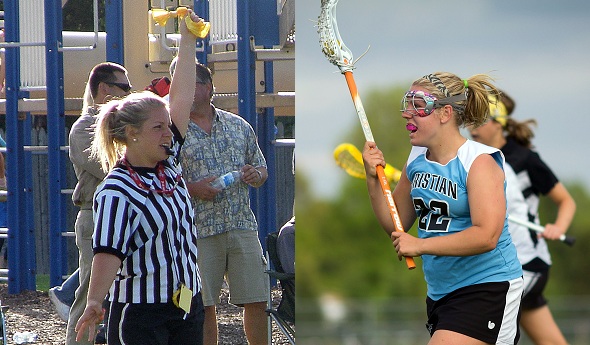
Legacy Program Serves New Officials
By
Rob Kaminski
MHSAA benchmarks editor
October 5, 2012
Implemented 20 years ago by the MHSAA, the Legacy Student Officials Program continues to spawn enthusiastic young officials who are more likely to stay in the family beyond their formative years.
The program pairs high school juniors or seniors with mentors who are already registered MHSAA officials. The one-on-one tutelage serves to introduce, educate and encourage interested students, while upping the odds for retention. Both parties sign a Legacy Pledge form outlining the basic agreement, with one condition being that the students work only subvarsity contests with their mentor or other veteran MHSAA officials.
During the 2011-12 school year, 107 students participated as Legacy officials, bringing the total to 1,156 since 1992. It’s another example of the officiating lineage growing from within and taking care of its own. In many cases, the vets literally are family.
“After graduating high school in the spring of 2006, my father, Rick (an MHSAA registered official for more than 25 years), inspired me to register and work the football season the next fall,” said Chris “C.J.” Jackson. “The worst years of officiating for me were my first two seasons because I couldn’t stand the berating from coaches and fans. I wasn’t good, and everyone picked up on that. My Dad was the only person who kept me in the game. Six seasons later, I find myself going into my second season of college football working as a deep wing official for the Great Lakes Intercollegiate Athletics Conference (GLIAC). This achievement can only be attributed to my dad.”
Also following in Dad’s footsteps are Trevor and Austin Hartley of Lansing, as father, Eric, got them involved at an early age.
“He has helped me on the field, but more importantly off of the field to become a better official in general and a better person,” said Trevor of Eric. “He was responsible for getting me into officiating, but staying in has been a goal from the beginning.”
Trevor’s sentiment is common among the species. Once officiating gets into the bloodstream – whether from immediate family or from a mentor in the extended family – it tends to stay.
Mentors in the Legacy Program take their roles seriously, and spend countless unpaid hours helping their students develop. The finished product is all the compensation they need.
“If it weren’t for my mentor pushing me and telling me I could be a really great official, I never would have kept going this far. I continue to officiate because it is a great opportunity to give back and be a part of something I love with a passion, and that is sports,” said Detroit Martin Luther King grad Kyle Bowen, who first registered in 2008 under the guidance of Detroit’s Darryl Jones.
The basketball official has taken his skills to Grand Rapids, where he attends Grand Valley State University and continues work as an official while discovering its ancillary benefits.
“Being an official has helped me so much in a lot of different aspects in my life,” Bowen said. “I work at Grand Valley as a supervisor in the intramural program. That job entails developing and training new officials so we can produce quality officiating in our program.
 “Darryl showed me how important it is to have tough skin and how to handle adverse situations when they come up and not let them linger. He taught me that officiating is probably one of the best things you could ever do, but it’s not for everyone.”
“Darryl showed me how important it is to have tough skin and how to handle adverse situations when they come up and not let them linger. He taught me that officiating is probably one of the best things you could ever do, but it’s not for everyone.”
Not for everyone, but thanks to a growing list of sports, there are more opportunities to lure potential candidates. When the Legacy Program was launched, competitive cheer and lacrosse were not yet MHSAA-sponsored sports. Cheer hit the tournament scene in 1994, while lacrosse arrived in 2005. As participation in those sports continues to increase, the pool of potential officials expands.
For recent Oakland University graduate Leah DiCristofaro, cheerleading was something she’d enjoyed since the age of 5. Her mother Renee is a veteran official for the Michigan Cheer Judges Association, where Candy Cox also serves as one of the state’s top judges.
“When Leah was a senior in high school (St. Clair Shores Lake Shore), she registered as a Legacy official,” Cox said. “She had a mentor who was with her at every competition during that year. At her first competition, she worried that she would miss something and not credit the teams properly. But, with guidance from her mentor and fellow judges those fears were short-lived.”
DiCristofaro continued to judge during college, but on a limited basis. The fact she took on any assignments at all illustrated her commitment, as she not only was putting up grades worthy of making the national honor roll, but she was a four-year starter for the Grizzlies softball team. As a catcher and designated player, DiCristofaro led the team with a .308 batting average as a sophomore, and tied for the team lead with six homers as a senior last spring.
“She accepted a limited amount of meets, but she kept officiating throughout all four years of college. Last year she filled in several times for officials who cancelled at the last minute,” Cox said.
Across the state, Helen Young experienced a similar childhood centered around athletics. Her parents, Neal and Vicki, coach lacrosse for Grand Rapids Christian schools. Vicki oversees the youth program, 3rd through 12th grades, and coaches the middle school. Neal is the varsity head coach at Christian High School, where Helen excelled and earned numerous honors.
Through her experiences, she also began to help her mother coach the middle school team, and made acquaintances like Nancy Lapekas of the West Michigan Lacrosse Association. Young was hooked.
“Nancy Lapekas has been so helpful in teaching me, assigning me, and supporting me on and off the lacrosse field,” said Young, who last spring earned a $1,000 scholarship from Michigan Lacrosse. “She has kept me going. As a young ref, if she didn't have my back I don't think I would have been able to continue. I love all aspects of the sport. I play, coach, and officiate, and it is nice to see the game from all angles.”
Young is a freshman at Michigan State University, and already plans to have a busy spring, when she’ll be balancing classwork and officiating.
“The most rewarding part of being a younger official is that I get to meet and ref with wonderful role models,” she said. “Some of the greatest people are adults I get to work with on the field. The cool part about my relationship with these other refs is that they are there for me off the field as well.”
That’s the beauty of the Legacy Program. A dedicated mentor sets the wheels in motion and opens a world of possibilities to students dedicated enough to seek advancement. There are no limits to the number of contacts and support groups in the industry.
Luke Bowman is a 2008 Jackson Lumen Christi grad who still leans on mentor Chuck Walters from time to time.
“Chuck has been a huge influence in my officiating career. I am always able to give him a call to bounce rule questions off of, even after I left my hometown being 100 miles away up at Central Michigan University.”
Like all young officials, Bowman soon realized that there were more people like Walters wherever he went; an endless supply of support personnel the further one delves into this avocation.
“The Capital Area Officials Association in Lansing has helped me grow as an official by constantly challenging my skills and abilities,” Bowman said. “Each meeting begins with a closed-book rules quiz to test our knowledge. Why is it closed-book? On Friday nights we can’t bust out the rules book on the field. The tools and resources available to the members range from evaluations at games and scrimmages to working with veteran officials.”
 A couple common threads bond Legacy officials who continue to register with the MHSAA. Many are college-bound, or first officiated at the youth level.
A couple common threads bond Legacy officials who continue to register with the MHSAA. Many are college-bound, or first officiated at the youth level.
Michael Reseigh fits the bill. While playing soccer at Rochester High School, Reseigh officiated local club games for five years. When his playing days were done he set his sights on officiating the high school level and contacted Pat Hayes of the Soccer Referees Association in the spring of 2009.
Now a senior at the University of Michigan, he has been at it ever since, with help from Hayes.
“When I went to college, my availability became limited. I was almost completely unavailable for the boys season in the fall. I was available, however, for the girls season since my semester at college finished at the end of April. I expressed my desire to Pat Hayes that I remain active in the association despite my limited availability. She has been great to me, giving me as many games as possible for the month of May when I come home,” Reseigh said.
Of course, not all in the world of fun and games is, well, fun and games. Young officials will experience all of the pitfalls that come with the uniform; tense moments, nervousness, missed calls and clashes with coaches.
They also have the additional burden of learning mechanics, contest rules and philosophies while working the lowest levels where the most chaotic action and least sympathetic coaches preside. Then, there’s the final hurdle of perception, simply brought on by their youthful appearance. It’s been said by many a veteran official that the least experienced officials have the toughest games to work.
“Some of the challenges I have had are due to my age,” Young said. “I think coaches don't take me seriously, and expect I don't know what I am talking about. If I let it bother me, then I probably wouldn't be able to ref. One time I made a call, and the coach proceeded to scream at me and yell at me and come onto the field. The behavior was even more ridiculous because it was a 5th/6th-grade game! I think that he felt like he could yell at me because I was a young ref.”
Trevor Hartley relates a similar scenario.
“I have had to deal with it since Day One,” Hartley said. “In my first-ever football game, a youth game, a coach was arguing a no-call with me and questioned if I was any older than the 5th and 6th-grade players on the field.”
The participants at that level are far from perfect. Having people understand that is one of the luxuries youth players have and officials don’t. It’sone of the great double-standards of athletics.
“A first-year official doing a 5th-grade football game is expected by coaches, players and fans to look like, act like, talk like, and officiate like a Big Ten football official,” Jackson said. “Yes, every game is important, no matter the level of play, but it is impossible to expect the greatest officials at every level of play.”
Again, this is where the Legacy Program pays dividends, as the young officials are not left on an island. There is support early and often, all the while allowing officials to grow. For those who understand their role in the game, the benefits stretch beyond the fields and gyms.
“I would tell students who are hesitant to take the step and try officiating, as there is really nothing to lose,” said Reseigh.
“I have learned how to manage any type of situation due to officiating. It has taught me respect for the game and all involved with it as well as taking responsibility for my own actions,” Jackson said.
“To younger people who want to officiate I would say, ‘Go for it,’” said Young. “It is such a great experience and it really helped me mature and be confident.”
“In the heat of the moment, you are going to have to effectively communicate with coaches and players in intense conversations,” Bowman said. “These skills will translate to the workplace as well. I directly attribute my success in the workplace to officiating.”
“The best advice I can give is, ‘Just go out there and try it,’” Bowen said. “No one will be perfect and get every call, but if you put your best effort forward then you can do great things.”
Sounds like they’ve been well trained from those before them, and are more than capable of carrying on the officiating legacy.
PHOTOS: (Top) Helen Young, a girls lacrosse official and product of the Legacy program, called youth lacrosse games while also playing on Grand Rapids Christian's varsity. (Middle) Kyle Bowen is a Legacy program and Detroit Martin Luther King grad.
NOTE: This is the second installment in the series "Making – and Answering – the Call" detailing the careers and service of MHSAA officials. Click the link below to view the first.
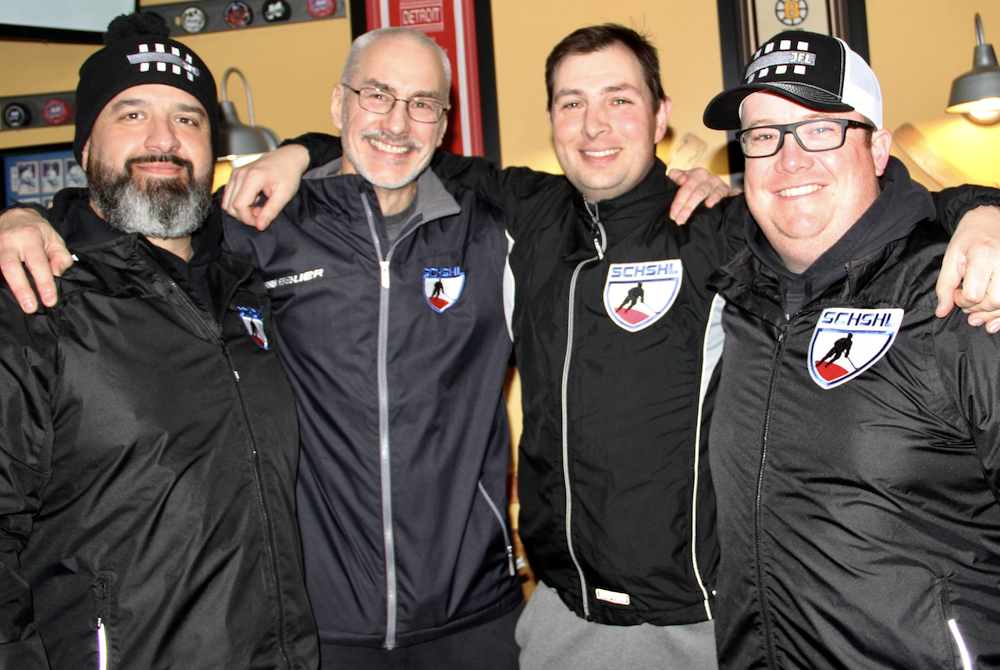
Referee Camaraderie: Bloopers, 'Nerding' Out, Lots of Laughs Create Powerful Bond
By
Pam Shebest
Special for MHSAA.com
February 13, 2024
KALAMAZOO — When it comes to blooper highlights, four MHSAA hockey officials don’t hesitate to share their miscues.
 One of them, Bob Corak, even has his pratfalls set to music on an internet site called Zebras with Pucks.
One of them, Bob Corak, even has his pratfalls set to music on an internet site called Zebras with Pucks.
Laughter is the sound of the day when the four gather every Tuesday after their yoga class at Nisker’s Char-Grill & Slap Shot Hockey Bar in Kalamazoo.
The camaraderie between Corak, Corey Butts, Nick Schrippa and Nat Swanson is evident, but the tone gets more serious once the talk turns to officiating.
“We’ve all played, we’ve all coached to some extent, but officiating is just what speaks to us,” Schrippa said. “That’s our niche.
“Every player on the ice has a fan in the stands. Every player on the ice has support on the bench. We’re the only support we have in the arena. We’re the only ones we can lean on. We’re kind of on an island.”
Most times the friends are part of different four-man crews made up of two referees and two linesmen for South Central High School Hockey League games. But that just gives them more to talk about when they get together on Tuesdays.
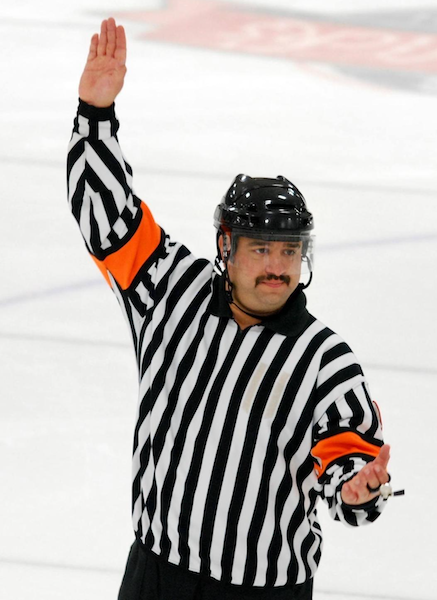 “We spend an hour every Tuesday with Bob’s wife (Susan) just kicking the crap out of us and then come to (Nisker’s) to debrief,” Schrippa said. Susan Corak runs Be Well Yoga and Fitness in Kalamazoo.
“We spend an hour every Tuesday with Bob’s wife (Susan) just kicking the crap out of us and then come to (Nisker’s) to debrief,” Schrippa said. Susan Corak runs Be Well Yoga and Fitness in Kalamazoo.
"We never talk about the workout. Somebody will bust out a phone and we’ll go over a video and we’ll talk about a situation, talk about rule differences,” he continued. “We are nerds to the nth degree, and that’s just how we’re wired.”
Yoga is a good way to keep in shape, the four friends agree.
“I’m a little older than most of the referees I meet,” said Corak, who retired after 35 years with Pfizer in information technology. "It keeps me limber, keeps me in shape to an extent, not a lot of cardio but the strength is there that we get from yoga, especially the core, plus injury prevention.
“If I’m not skating, I’m officiating or I’m working the books for the association (Kalamazoo Ice Hockey Officials Association).”
Corak assists in the scheduling, billing, etc., leading Schrippa to quip: “Remember when Bob said he did information technology? We take full advantage of that. He is, in fact, the glue that holds a lot of our shenanigans together. He really is.”
Referees vs. Linesmen
Butts and Corak prefer wearing the referees’ armbands, while Schrippa and Swanson like working the lines.
“’I’m a smaller guy,” said Butts, who has been officiating for 14 years. “Linesmen typically tend to be 6-foot-5. When you’re smaller than most of the players, it doesn’t work out well.
“I like the freedom to be able to get out of the way. It’s a high traffic area as a linesman.”
When not spending evenings officiating, Butts is the penalty box timekeeper for the ECHL Kalamazoo Wings home games. His day job as a third-party examiner for the state of Michigan means he gives driving tests, and that leads to some interesting conversations.
“I’ve given most of (the players) their driver’s licenses,” he said. “I’ve had a group of players in the middle of a high school hockey game, getting ready to drop the puck at the start of the third period, and they’re trying to schedule a driver’s test for the next day. I’m like, ‘Guys, not now. Talk to me after work.’”
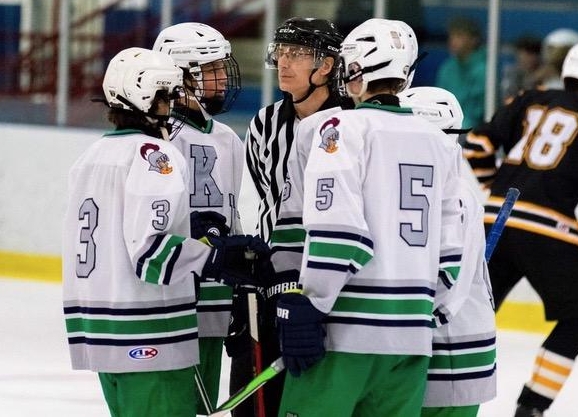 Swanson is the newest of the quartet, moving to the area three years ago from Syracuse, N.Y., where he started officiating at age 11.
Swanson is the newest of the quartet, moving to the area three years ago from Syracuse, N.Y., where he started officiating at age 11.
He is a pilot in the U.S. Air Force International Guard in Battle Creek flying MQ-9 Reaper Drones.
“I like refereeing better (than being a linesman) because I like managing the game and look at the big picture,” Swanson said. “Sometimes it’s great to be a linesman because they get to communicate with the players, crack jokes and sometimes throw the referee under the bus, ‘Yeah, I agree that was a terrible call. But you’ve got to move on.’”
All four also officiate college and youth hockey, which can lead to a dilemma.
“Those are all different rule books, so we don’t have to know just one set of rules,” Schrippa said. “None of them are what you see on TV.
“While we have a couple hundred people in the building who are yelling at us that we got it wrong because that’s what they saw on ESPN, that’s not how it works. So not only do we have to know the rules, we have to know the differences in the rules.”
With mentorship programs available, some current prep players are also officials for younger leagues.
“They’re learning, we’re teaching them,” Corak said. “We have games with them as officials, then we’ll officiate their games when they play for their schools.”
Swanson added: “I think that makes them better players because they understand the rules, where they can bend rules and where they can’t.”
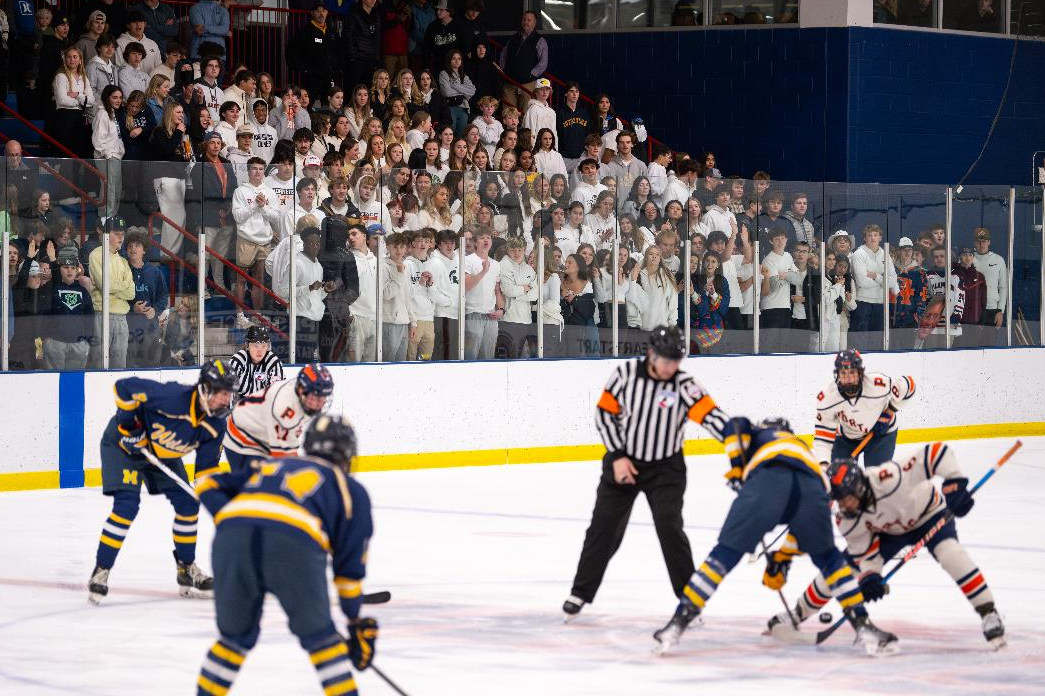 That is what led Schrippa to officiating.
That is what led Schrippa to officiating.
“(Late referee) Mike Martin was officiating a game and pulled me aside,” he said. “I was 22 years old and he asked if I wanted to become a ref.
“‘(Heck) you’ve broken all the rules,’ he told me. ‘You probably know most of them already. He wasn’t wrong. I talked to a couple friends who had done it, and they talked me into doing it 29 seasons ago. I fell in love with it.”
Fun with bloopers
All four laugh as they regale each other with their funniest and most embarrassing moments.
For Schrippa, it was the college game where he made his refereeing debut.
“I was given the rookie lap,” he said. “I was jazzed. I came out of the gate, turned left, went around the back of the net, got to the blue line, caught a toe pick and Supermanned, slid from the blue line to the top of the next faceoff circle and was soaked because the ice hadn’t set yet.
“I got a standing ovation from the few hundred fans that were in the rink. Both my linesmen were doubled over laughing. It was a very cold first period.”
Something similar happened to Swanson.
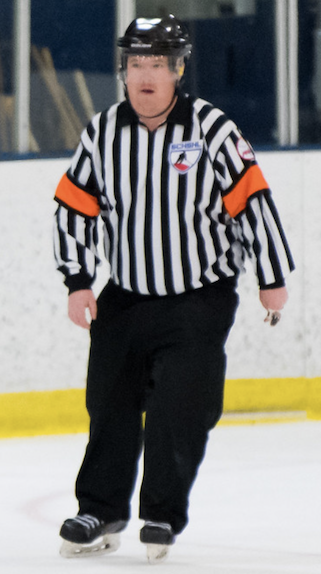 “I was taking a hot lap, not seeing they’ve got a carpet out for somebody, hitting the carpet and Supermanning,” he recalled. “Then having a linesman watch you do it as there’s a few hundred people in the stands and give a big washout sign.”
“I was taking a hot lap, not seeing they’ve got a carpet out for somebody, hitting the carpet and Supermanning,” he recalled. “Then having a linesman watch you do it as there’s a few hundred people in the stands and give a big washout sign.”
Butts and Swanson had moments that actually delayed the start of a game.
For Butts, “I forgot my pants because I washed them separate and my wife had to bring them to me, and we could not start the game until my pants arrived,” he said, while the others laughed and nodded in agreement.
Swanson actually found himself at the wrong rink one time.
“I’m like, ‘Where is everybody?’” he said. “My phone starts ringing. ‘Hey dude, game starts in 15 minutes. You going to be here? Uh, yes, in 20.’’’
The four agree most officials go through highs and lows, funny times and embarrassing times, and that’s one thing that brings them all together.
“What’s unique about what we do is I could meet another official from Sweden tomorrow who I’ve never met before, and within minutes we’ve already got that relationship,” said Schrippa, who is the Southwest Michigan communications representative for the Michigan Department of Transportation (MDOT).
“That’s something we all share, we all know that feeling, we all understand that bond and it just takes a second. It’s so neat, it’s powerful.”
 Pam Shebest served as a sportswriter at the Kalamazoo Gazette from 1985-2009 after 11 years part-time with the Gazette while teaching French and English at White Pigeon High School. She can be reached at [email protected] with story ideas for Calhoun, Kalamazoo and Van Buren counties.
Pam Shebest served as a sportswriter at the Kalamazoo Gazette from 1985-2009 after 11 years part-time with the Gazette while teaching French and English at White Pigeon High School. She can be reached at [email protected] with story ideas for Calhoun, Kalamazoo and Van Buren counties.
PHOTOS (Top) MHSAA hockey officials, from left: Nick Schrippa, Bob Corak, Nat Swanson and Corey Butts get together recently for one of their weekly hangouts. (2) Schrippa makes a call. (3) Corak, center, confers with a group of players. (4) Swanson prepares to drop the puck. (5) Butts monitors the game action. (Top photo by Pam Shebest; following photos provided by respective officials.)

